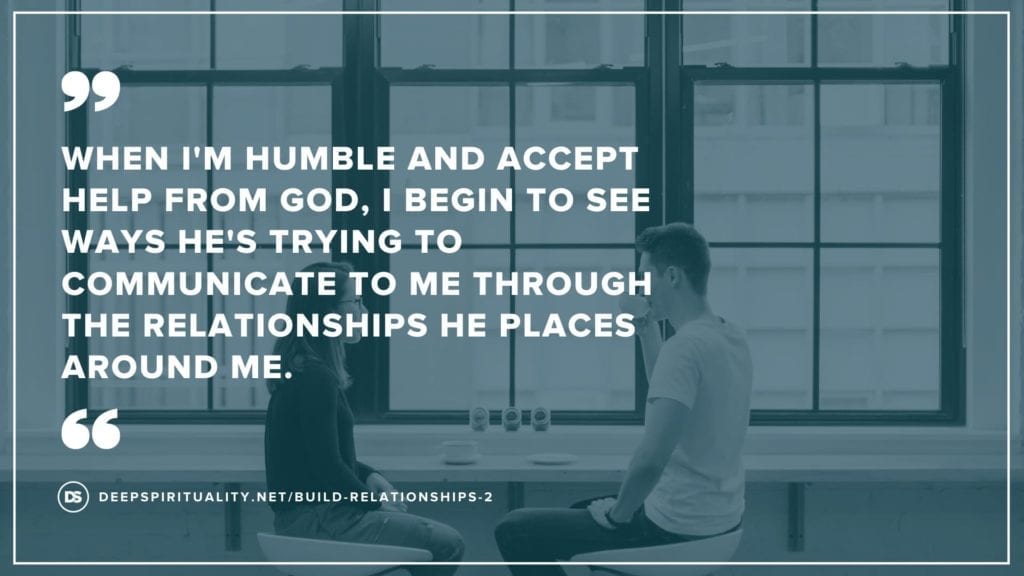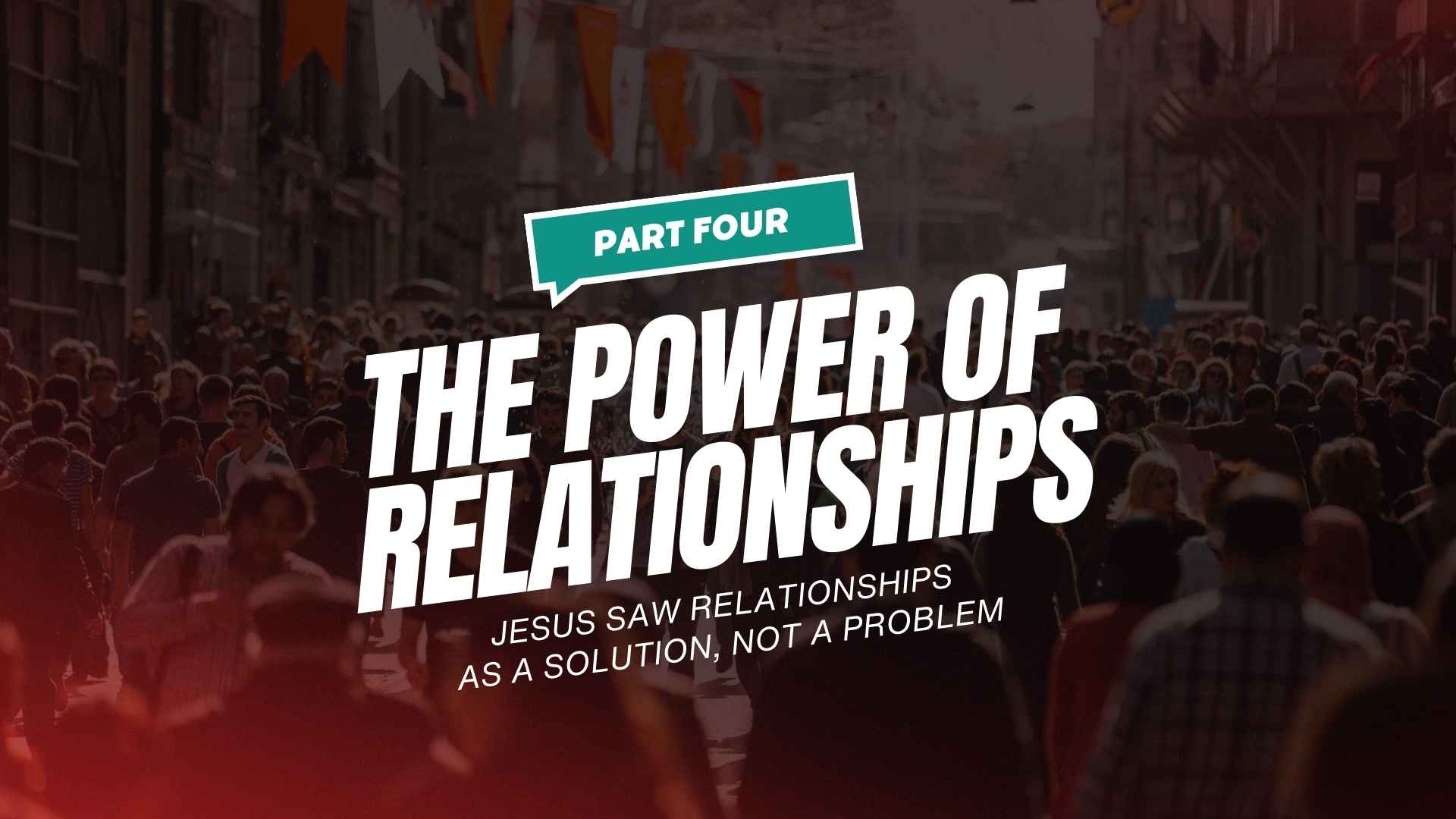If you are anything like me, you find that while some relationships come easily and naturally, others are extremely difficult.
Even so, while it can be easy for some friendship to form, allowing them to grow deeper can be even more of a challenge, as this is when further insecurities, deeper hurts, and greater needs arise.
It is in these moments that I can find myself unmotivated to build relationships, both new ones and deeper ones. I have had to look at two key areas in my life that stop me from being motivated to build relationships: pride and insecurity.
In this study, we will explore these two areas of our heart.
Humility: seeing our need
“Haughty eyes and a proud heart— the unplowed field of the wicked—produce sin.”
Proverbs 21:4 NIV
A proud heart gets to be the way it is because it has been, as the scripture says, unplowed. The act of plowing is the act of turning up soil to prepare it for seed. Regarding our hearts, it is the act of revealing and seeing the depths of what is in our hearts.
The amazing thing about doing this in our hearts is that we can open them up and prepare them to hear God, allowing Him to meet the needs of our hearts. However, if we do not plow our hearts and our areas of pride, we are unable to hear and be moved by God. We have effectively hardened ourselves against Him.
Relationships are opportunities to plow our hearts: chances to talk and engage areas that we have left untouched. They also are a chance to allow people to ask questions to help us plow these untouched parts of our hearts. However, when we are proud, we begin to actively avoid and/or resist this experience.

When I do this, I see no need for relationships in my life. Relationships end up feeling more like work and a burden, rather than a chance to connect and experience intimacy. At times, the relationships also feel competitive and combative as I grow worried about being “attacked.” However, this usually is just a friend who is trying to help me plow the unplowed ground of my heart.
As a proud person, it is hard for me to see and accept the truth of my heart, including the truth that I am proud. Below are some questions I often ask myself to help me navigate my heart in this situation.
How do you see yourself?
“Do you see a person wise in their own eyes? There is more hope for a fool than for them.”
Proverbs 26:12 NIV
I don’t always enjoy reading the question in this scripture, because oftentimes the person I see who is wise in their own eyes is myself. It is amazing to know that in the eyes of God, it is better to be a fool than to see myself as wise.
I would imagine this is because a fool has at least some chance of seeing their error and their need for help.
On the other hand, someone who thinks of themselves as wise has no chance of being open to seeing their need or getting help. In their eyes, they already figured it out, or sometimes even worse, they believe they know better than the relationships around them.
“For by the grace given me I say to every one of you: Do not think of yourself more highly than you ought, but rather think of yourself with sober judgment, in accordance with the faith God has distributed to each of you. For just as each of us has one body with many members, and these members do not all have the same function, so in Christ we, though many, form one body, and each member belongs to all the others.”
Romans 12:3-5 NIV
Too often my deceit keeps me from experiencing closer relationships because when I am deceitful I never have to face the truth of who I am and what I need. When we look at ourselves with sober judgment and define ourselves as God does, we can have genuine confidence and can see our need for others.
We know who we are and our role. At the same time, we understand why God has placed others and their roles in our lives.
Just as a body is more than merely the sum of its parts, we are stronger together when we rely on the strengths given through the relationships around us. Having humility enables us to have the motivation we need to seek relationships.
Pause and reflect
- How do you see yourself?
- Can you confidently say you see yourself with sober judgment?
- Or do you, like me, overestimate yourself because you are never honest with yourself or the people around you?
How do you see God?
“In his pride the wicked man does not seek him; in all his thoughts there is no room for God. His ways are always prosperous; your laws are rejected by him; he sneers at all his enemies. He says to himself, ‘Nothing will ever shake me.’ He swears, ‘No one will ever do me harm.’”
Psalm 10:4-6 NIV
The day I journeyed to see the Taj Mahal was a day I will never forget. I got on a train in Delhi with packed cars with no air conditioning and blistering heat. We sat there on this train for 3 hours and witnessed the beautiful sights of the Indian countryside.
I remember, at one point, getting to sit on the edge of the train and watch the sunset beyond the crops and know that back home, the same sun was just beginning to rise.
By the time we had arrived in the city where the Taj Mahal resides, we still had miles to travel to reach our destination. Through lines of tourists, crowds of merchants, and that humid heat of India, we navigated our way toward the Taj Mahal. When we finally arrived, we thought nothing of our journey.
As I look back now on the journey to and from the Taj Mahal, I look on it with profound fondness. Both the seeking of the Taj Mahal and the seeing of it were beautiful. This is what it should be like for us to seek God.

Though circumstances are not always perfect, and plans don’t always go as we would like them to, the journey of seeking God, as well as the joy of seeing Him, are profound and life-changing.
Pride is what keeps us from this experience. It blinds us to the truth of our needs and, therefore, from being able to seek and see God. When living this way, our goal in life becomes to “always (be) prosperous,” never to be shaken, and never to feel harmed. This prevents us from having room for God in our hearts, especially when He wants to connect to us through the relationships He has placed in our life.
When I am humble and accept help, influence, and truth from God, I begin to see ways He is trying to communicate to me through the relationships He places around me.
It is in these moments that many problems in my life and my relationships disappear. I go from seeing people as an enemy to seeing them as an opportunity to see and hear God and the truth He wants for me to see and hear.
Pause and reflect
- How do you feel about the journey of seeking and seeing God? Do you see your need for God?
- Do you tend to see yourself as greater than you are or lesser? Ask a friend what they think you communicate about yourself. For both of these answers, admit the pride and search to see how God truly sees you.
- In what areas of your life have been resistant to the influence of people, and what do you think God is trying to communicate to you in these areas?
- What can you do today to choose to seek God and see Him in your life?
Security: feeling our need
“But you, Sovereign Lord, help me for your name’s sake; out of the goodness of your love, deliver me. For I am poor and needy, and my heart is wounded within me.”
Psalm 109:21-22 NIV
Most of us have something that causes us to feel poor and in need. We can be poor in many areas of our life: poor in relationships, poor in happiness, poor in peace, poor in hope, etc.
However, if we are never secure enough to admit our needs and areas of poverty, and if we always feel we have to be “strong enough” on our own, then we become unable to experience the healing power of God’s love.
The inspiring thing about David, the writer of this Psalm, is that he continually turned to God in his times and areas of need. There are other options other than turning to God, yet as we will see in the next scripture, these do not sustain us in our needs.
What do you trust in?
“Such is the destiny of all who forget God; so perishes the hope of the godless. What they trust in is fragile; what they rely on is a spider’s web. They lean on the web, but it gives way; they cling to it, but it does not hold. They are like a well-watered plant in the sunshine, spreading its shoots over the garden; it entwines its roots around a pile of rocks and looks for a place among the stones. But when it is torn from its spot, that place disowns it and says, ‘I never saw you.’ Surely its life withers away, and from the soil other plants grow.”
Job 8:13-19 NIV
When we trust in and turn to things other than God, we will be disappointed. It is like leaning on a spider’s web. Doing this leaves us feeling deeply insecure. As it says in the scripture, living this way leaves us relying on people and things that will eventually “disown” us.
“Hear me, Lord, and answer me, for I am poor and needy. Guard my life, for I am faithful to you; save your servant who trusts in you. You are my God;”
Psalm 86:1-2 NIV
It is much better to handle these areas of need in our life by turning to God and choosing to trust Him. This is something exemplified by Paul in the following scripture.
What do you feel about your needs and weaknesses?
“… Therefore, in order to keep me from becoming conceited, I was given a thorn in my flesh, a messenger of Satan, to torment me. Three times I pleaded with the Lord to take it away from me. But he said to me, ‘My grace is sufficient for you, for my power is made perfect in weakness.’
Therefore I will boast all the more gladly about my weaknesses, so that Christ’s power may rest on me. That is why, for Christ’s sake, I delight in weaknesses, in insults, in hardships, in persecutions, in difficulties. For when I am weak, then I am strong.”
2 Corinthians 12:7-10 NIV
Paul dared to boast, not about his strengths, but his weaknesses. He realized that with God, weakness was no longer a negative thing. Instead, it became something incredibly positive. It became an opportunity for Paul to grow stronger, not because of his personal strength, but because he was attached to God’s.
Paul found the secret to flipping a weakness on its head because, with God, weakness becomes nearly a superpower. It reminds me of an incredibly powerful scene in the movie “Dr. Strange” (spoiler alert for those who have not yet seen the movie in the last four years).
In the movie, the main character, Dr. Stephen Strange, a brilliant neurosurgeon, loses his ability to use his hands and subsequently goes on a quest to discover a means to use them again so he can return to his life as a surgeon.
He discovers that his only hope to heal his hands is to use magic, just as he had seen another person do with their legs. But in doing so, he would have to lose all his superpowers in the effort of restoring his hands. At this moment, he learns he has “a choice: to return to his own life or to serve something greater than himself.”
Here is the dialogue in the exchange:

Dr. Stephen Strange: He uses magic to walk.
The Ancient One: Constantly. He had a choice, to return to his own life or to serve something greater than himself.
Dr. Stephen Strange: So I could have my hands back again. My old life?
The Ancient One: You could and the world would be all the lesser for it.
Dr. Strange had the chance to accomplish his goal: To change his weakness and no longer have his broken hands. Yet in doing so he would have lost all of his powers, and the world would have been “lesser for it.” As we see in this illustration, weakness is not a negative. Weakness is a chance to grow closer to God, be bonded in a relationship, and impact others around us.
My insecurity and pride are rooted in my resistance to vulnerability. However, when I allow this to humble me and help me see and feel my need for relationships, I become more motivated to pursue those who I can learn from. This changes how I view and build relationships around me – learning from them, rather than resisting them.
“Calling the Twelve to him, he began to send them out two by two and gave them authority over impure spirits. These were his instructions: ‘Take nothing for the journey except a staff—no bread, no bag, no money in your belts. Wear sandals but not an extra shirt. Whenever you enter a house, stay there until you leave that town.
And if any place will not welcome you or listen to you, leave that place and shake the dust off your feet as a testimony against them.’ They went out and preached that people should repent. They drove out many demons and anointed many sick people with oil and healed them.”
Mark 6:7-13 NIV
For a long time, I was confused by why Jesus told the apostles to travel this way. Why would he want them to be without food, money, and extra pairs of clothes? Why would he want them to stay with the same people the entire time they are in a certain town, eating their food, and bothering that particular family?
I think Jesus gave this instruction because it forced the apostles to be relational and humble. In this way, Jesus was teaching them what true godly relationships are all about. They are not about being the best or having a great performance, which are both things I have relied on in relationships in my life.
The apostles were forced to connect and rely on relationships, specifically ones they had not even made yet. This is who Jesus was, and this is who God is. God goes out of his way to connect with us through humility. He shows us an example of what it is to be secure enough to travel without what seems like necessities, and enter in relationships from the standpoint of weakness rather than strength.
I am not this way. I see this the most in my relationship with my wife, where I miss out on opportunities to be vulnerable and express my need for help. She is someone who tends to keep a more healthy pace in life and knows when we need to slow down. Yet when I am living busy and driven by my anxiety, I hate the thought of doing something as simple as slowing down enough to ask for her help and perspective on my day-to-day plans, my heart condition, and my motives.
I personally need to grow to be able to express what help I need: being willing to first see the need, feel the need, express the need, and in turn meet the need, just as these apostles had done. When we live this way we will be motivated to have relationships: not just to take for ourselves, but give in return.
Pause and reflect
- How can you choose to be and show need, weakness, and the areas of “poverty” in your life?
- How do you think God can turn these into a strength?
- What impact can you choose to have on relationships around you by choosing to feel and display your needs?
Continue this series
This article is part two of the “Why Am I So Unmotivated to Build Relationships” study. To read the first part, click here.
Explore more:
An alum from both Santa Clara University and Stanford University, Nick is passionate about helping people see God from a new perspective, and is an occasional contributor to the Deep Spirituality writing team.
An alum from both Santa Clara University and Stanford University, Nick is passionate about helping people see God from a new perspective, and is an occasional contributor to the Deep Spirituality writing team.





